外研版(2019)必修 第三册Unit 1 Knowing me, Knowing you Using language 过去分词作状语 课件(共23张PPT 内嵌视频)
文档属性
| 名称 | 外研版(2019)必修 第三册Unit 1 Knowing me, Knowing you Using language 过去分词作状语 课件(共23张PPT 内嵌视频) |

|
|
| 格式 | pptx | ||
| 文件大小 | 37.7MB | ||
| 资源类型 | 教案 | ||
| 版本资源 | 外研版(2019) | ||
| 科目 | 英语 | ||
| 更新时间 | 2023-11-23 12:37:16 | ||
图片预览

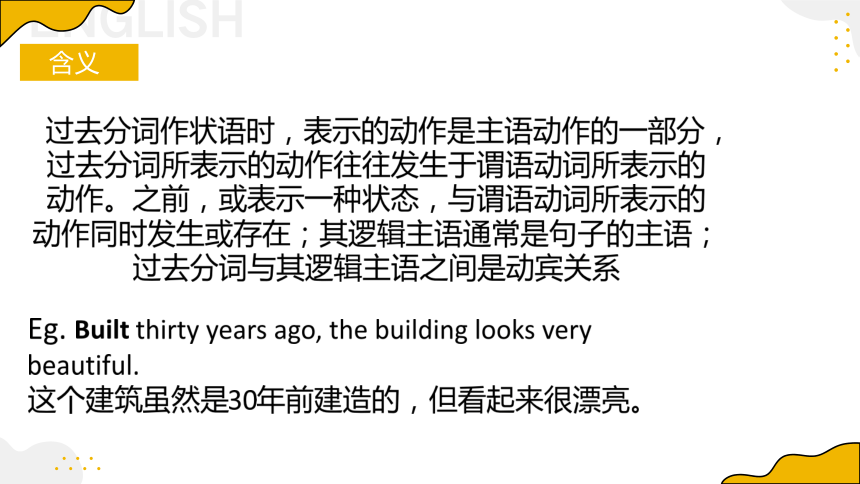


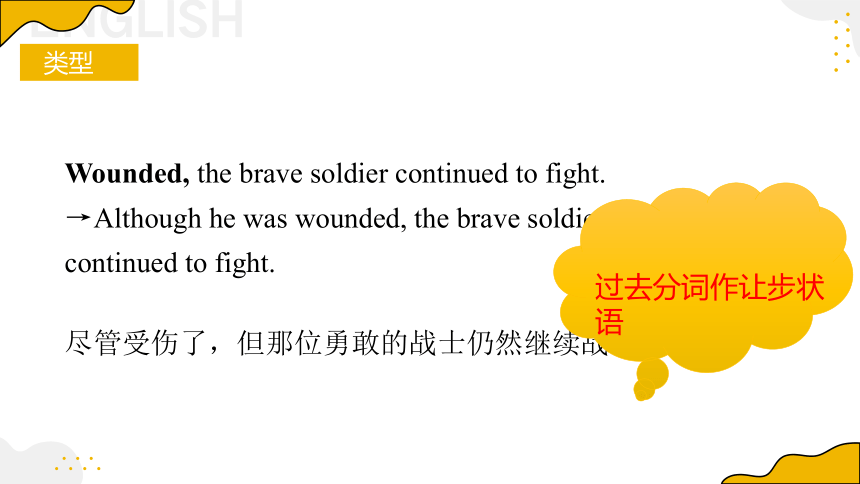
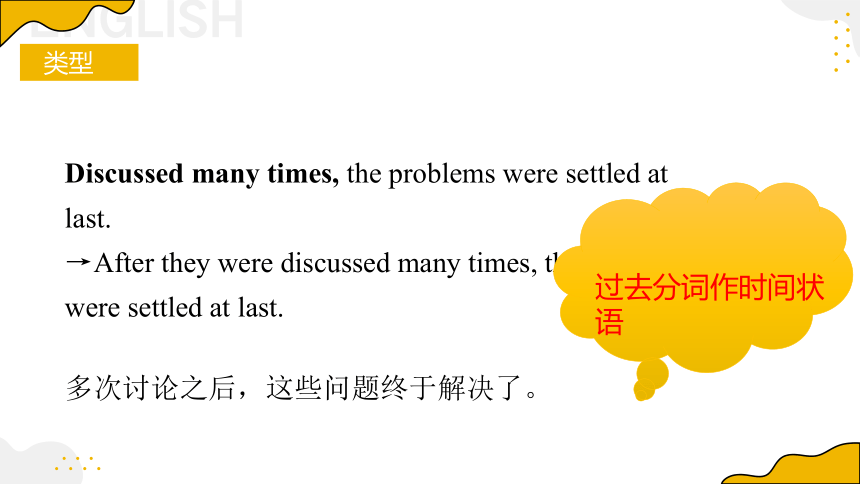
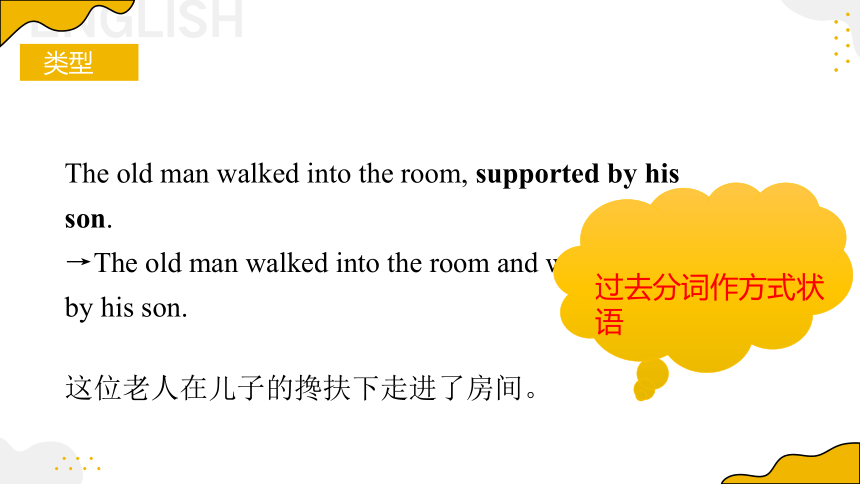
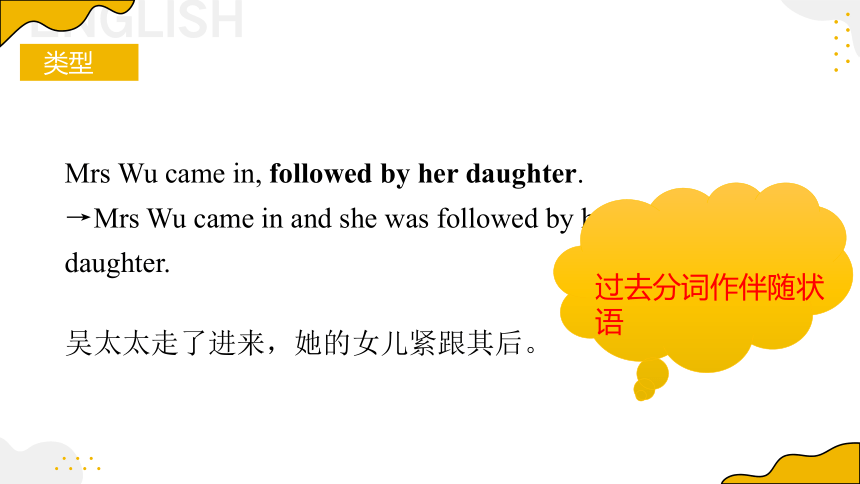
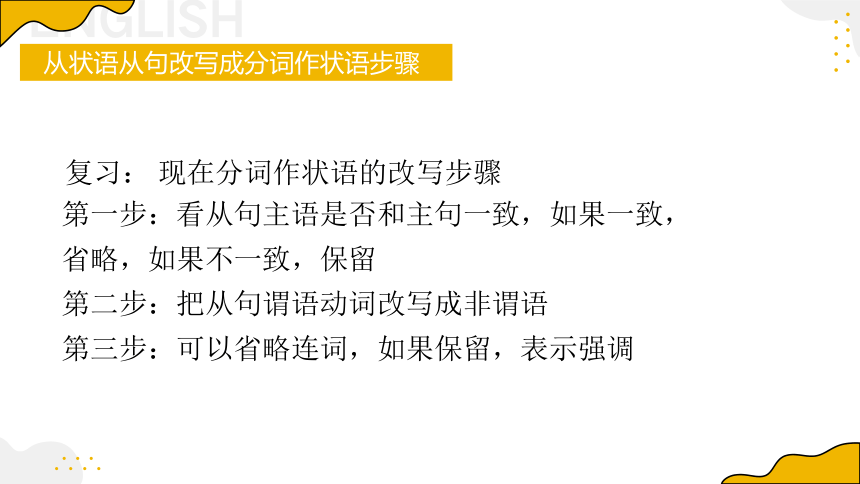
文档简介
(共23张PPT)
ENGLISH
Using language
过去分词作状语
ENGLISH
含义
Eg. Built thirty years ago, the building looks very beautiful.
这个建筑虽然是30年前建造的,但看起来很漂亮。
过去分词作状语时,表示的动作是主语动作的一部分,过去分词所表示的动作往往发生于谓语动词所表示的动作。之前,或表示一种状态,与谓语动词所表示的动作同时发生或存在;其逻辑主语通常是句子的主语;过去分词与其逻辑主语之间是动宾关系
ENGLISH
类型
过去分词作状语时,可表示原因、条件、让步、时间、方式和伴随情况。过去分词作方式状语和伴随状语时可以变为并列句,作其他状语时可以变为相应的状语从句。
Encouraged by the progress he has made, he works harder.
→As he's encouraged by the progress he has made, he works harder.
由于受到所取得进步的鼓舞,他工作更努力了。
过去分词作原因状语
ENGLISH
类型
Given more time, we could do it much better.
→If we were given more time, we could do it much better.
如果多给我们点时间,我们会做得更好。
过去分词作条件状语
ENGLISH
类型
Wounded, the brave soldier continued to fight.
→Although he was wounded, the brave soldier continued to fight.
尽管受伤了,但那位勇敢的战士仍然继续战斗。
过去分词作让步状语
ENGLISH
类型
Discussed many times, the problems were settled at last.
→After they were discussed many times, the problems were settled at last.
多次讨论之后,这些问题终于解决了。
过去分词作时间状语
ENGLISH
类型
The old man walked into the room, supported by his son.
→The old man walked into the room and was supported by his son.
这位老人在儿子的搀扶下走进了房间。
过去分词作方式状语
ENGLISH
类型
Mrs Wu came in, followed by her daughter.
→Mrs Wu came in and she was followed by her daughter.
吴太太走了进来,她的女儿紧跟其后。
过去分词作伴随状语
ENGLISH
从状语从句改写成分词作状语步骤
复习: 现在分词作状语的改写步骤
第一步:看从句主语是否和主句一致,如果一致,省略,如果不一致,保留
第二步:把从句谓语动词改写成非谓语
第三步:可以省略连词,如果保留,表示强调
ENGLISH
从状语从句改写成分词作状语步骤
= (As) being ill, he has to stay at home.
Eg. As he is ill, he has to stay at home.
Eg. Unless Tom was invited, I would go the party.
= (Unless) Tom invited, I would go the party.
ENGLISH
从状语从句改写成分词作状语步骤
=Surrounded by a group of kids, he feels very happy
Eg. He is surrounded by a group of kids and feels very happy.
Eg. As he was permitted by his manager, the worker got a day off.
= (As) Permitted by his manager, the worker got a day off.
ENGLISH
位置
过去分词作状语时,通常放在句首或句末,有时也可放在句中,常用逗号与主句隔开。
注意:过去分词作状语时,有时为了强调,前面可带有连词(如when, while, if, though, as if, unless等),构成“连词+过去分词”结构,以使句意表达得更清楚。
Eg. Unless constantly repeated, the English words are easily forgotten.
这些英语单词很容易被忘记,除非不断重复(记忆)。
ENGLISH
位置
Eg. When asked why she came here, the young girl kept silent.
当被问到为何来这儿时,那个年轻的女孩沉默不语。
Eg. She began to cry as if bitten by a snake.
她大叫起来,好像被蛇咬了。
ENGLISH
位置
注意:过去分词作状语时,其逻辑主语必须与句子的主语保持一致,否则需加上自己的主语,构成独立主格结构。
Eg. Given a chance, we can surprise the world.
若给我们一个机会,我们会震惊世界。(give的逻辑主语是we)
ENGLISH
位置
He was listening attentively in class, his eyes fixed on the blackboard.
他课上专心听讲,眼睛盯着黑板。(fix的逻辑主语是his eyes)
ENGLISH
位置
有些形容词化的过去分词,作状语时不强调被动而重在描述主语的状态。这样的过去分词(短语)常见的有seated, hidden, lost/absorbed in, dressed in, tired out等。
Lost in thought, he didn't hear the bell.
由于陷入深思之中,他没有听到铃声。
ENGLISH
过去分词与现在分词作状语的区别
语法 逻辑关系 时间概念
过去分词作状语 过去分词所表示的动作与句子主语之间是逻辑上的动宾关系,即表示被动 过去分词所表示的动作往往发生于谓语动词所表示的动作之前,或表示“一种状态”,与谓语动词所表示的动作同时发生或存在
现在分词作状语 现在分词所表示的动作与句子的主语之间是逻辑上的主谓关系,即表示主动 现在分词的一般式表示的动作与谓语动词所表示的动作同时发生或几乎同时发生;现在分词的完成式表示的动作发生在谓语动词所表示的动作之前
ENGLISH
Seeing from the hill, you will find the city looks like a big garden.
从山上看,你会发现这座城市看起来像一个大花园。(see与句子的主语you之间是逻辑上的主谓关系)
Seen from the hill, the city looks like a big garden.
从山上看,这座城市看起来像一个大花园。(see与句子的主语the city之间是逻辑上的动宾关系)
过去分词与现在分词作状语的区别
ENGLISH
过去分词与现在分词的完成被动式(having been done)作状语时,都具有被动意义,有时可以互换,但是having been done结构强调动作先于句子的谓语动词所表示的动作。
Examined carefully, the patient was sent to the operation room.=Having been examined carefully, the patient was sent to the operation room.
仔细检查之后,那个病人被送进了手术室。
过去分词与现在分词作状语的区别
ENGLISH
Shown around the lab, we were taken to see the library.=Having been shown around the lab, we were taken to see the library.
参观了实验室之后,我们又被带去参观图书馆。
过去分词与现在分词作状语的区别
ENGLISH
1.用状语从句或并列句替换句中黑体部分
①Asked why he was late, he went red.
When he was asked why he was late
②United, we stand; divided, we fall.
If we are united; if we are divided
③Inspired by what he said, we are determined to study hard.
Since/Because we are inspired by what he said
④An old man entered, supported by a girl.
and he was supported by a girl
练习
ENGLISH
2.单句语法填空
①Unless invited (invite), I would not attend that party.
②Criticised (criticise) by the teacher, the girl was very upset.
③Attracted (attract) by the beauty of nature, the girl from London decided to spend another two days on the farm.
④Followed (follow) by his students, the teacher went into the lab.
⑤When given (give) a physical examination, you should keep calm.
练习
ENGLISH
3.完成句子
①Little Tom sat, amazed, watching the monkey dancing in front of him.
小汤姆坐着,吃惊地看着猴子在他前面跳舞。
②Absorbed in painting, John didn't notice evening approaching.
由于专心绘画,约翰没有注意到夜幕正在降临。
4.Influenced by him, more and more people fall in love with outdoor activities.
受他的影响,越来越多的人喜欢上了户外活动。
5.Encouraged by his teacher's words, he went on with his research work.
通过老师话语的鼓励,他继续他的研究工作。
练习
ENGLISH
Using language
过去分词作状语
ENGLISH
含义
Eg. Built thirty years ago, the building looks very beautiful.
这个建筑虽然是30年前建造的,但看起来很漂亮。
过去分词作状语时,表示的动作是主语动作的一部分,过去分词所表示的动作往往发生于谓语动词所表示的动作。之前,或表示一种状态,与谓语动词所表示的动作同时发生或存在;其逻辑主语通常是句子的主语;过去分词与其逻辑主语之间是动宾关系
ENGLISH
类型
过去分词作状语时,可表示原因、条件、让步、时间、方式和伴随情况。过去分词作方式状语和伴随状语时可以变为并列句,作其他状语时可以变为相应的状语从句。
Encouraged by the progress he has made, he works harder.
→As he's encouraged by the progress he has made, he works harder.
由于受到所取得进步的鼓舞,他工作更努力了。
过去分词作原因状语
ENGLISH
类型
Given more time, we could do it much better.
→If we were given more time, we could do it much better.
如果多给我们点时间,我们会做得更好。
过去分词作条件状语
ENGLISH
类型
Wounded, the brave soldier continued to fight.
→Although he was wounded, the brave soldier continued to fight.
尽管受伤了,但那位勇敢的战士仍然继续战斗。
过去分词作让步状语
ENGLISH
类型
Discussed many times, the problems were settled at last.
→After they were discussed many times, the problems were settled at last.
多次讨论之后,这些问题终于解决了。
过去分词作时间状语
ENGLISH
类型
The old man walked into the room, supported by his son.
→The old man walked into the room and was supported by his son.
这位老人在儿子的搀扶下走进了房间。
过去分词作方式状语
ENGLISH
类型
Mrs Wu came in, followed by her daughter.
→Mrs Wu came in and she was followed by her daughter.
吴太太走了进来,她的女儿紧跟其后。
过去分词作伴随状语
ENGLISH
从状语从句改写成分词作状语步骤
复习: 现在分词作状语的改写步骤
第一步:看从句主语是否和主句一致,如果一致,省略,如果不一致,保留
第二步:把从句谓语动词改写成非谓语
第三步:可以省略连词,如果保留,表示强调
ENGLISH
从状语从句改写成分词作状语步骤
= (As) being ill, he has to stay at home.
Eg. As he is ill, he has to stay at home.
Eg. Unless Tom was invited, I would go the party.
= (Unless) Tom invited, I would go the party.
ENGLISH
从状语从句改写成分词作状语步骤
=Surrounded by a group of kids, he feels very happy
Eg. He is surrounded by a group of kids and feels very happy.
Eg. As he was permitted by his manager, the worker got a day off.
= (As) Permitted by his manager, the worker got a day off.
ENGLISH
位置
过去分词作状语时,通常放在句首或句末,有时也可放在句中,常用逗号与主句隔开。
注意:过去分词作状语时,有时为了强调,前面可带有连词(如when, while, if, though, as if, unless等),构成“连词+过去分词”结构,以使句意表达得更清楚。
Eg. Unless constantly repeated, the English words are easily forgotten.
这些英语单词很容易被忘记,除非不断重复(记忆)。
ENGLISH
位置
Eg. When asked why she came here, the young girl kept silent.
当被问到为何来这儿时,那个年轻的女孩沉默不语。
Eg. She began to cry as if bitten by a snake.
她大叫起来,好像被蛇咬了。
ENGLISH
位置
注意:过去分词作状语时,其逻辑主语必须与句子的主语保持一致,否则需加上自己的主语,构成独立主格结构。
Eg. Given a chance, we can surprise the world.
若给我们一个机会,我们会震惊世界。(give的逻辑主语是we)
ENGLISH
位置
He was listening attentively in class, his eyes fixed on the blackboard.
他课上专心听讲,眼睛盯着黑板。(fix的逻辑主语是his eyes)
ENGLISH
位置
有些形容词化的过去分词,作状语时不强调被动而重在描述主语的状态。这样的过去分词(短语)常见的有seated, hidden, lost/absorbed in, dressed in, tired out等。
Lost in thought, he didn't hear the bell.
由于陷入深思之中,他没有听到铃声。
ENGLISH
过去分词与现在分词作状语的区别
语法 逻辑关系 时间概念
过去分词作状语 过去分词所表示的动作与句子主语之间是逻辑上的动宾关系,即表示被动 过去分词所表示的动作往往发生于谓语动词所表示的动作之前,或表示“一种状态”,与谓语动词所表示的动作同时发生或存在
现在分词作状语 现在分词所表示的动作与句子的主语之间是逻辑上的主谓关系,即表示主动 现在分词的一般式表示的动作与谓语动词所表示的动作同时发生或几乎同时发生;现在分词的完成式表示的动作发生在谓语动词所表示的动作之前
ENGLISH
Seeing from the hill, you will find the city looks like a big garden.
从山上看,你会发现这座城市看起来像一个大花园。(see与句子的主语you之间是逻辑上的主谓关系)
Seen from the hill, the city looks like a big garden.
从山上看,这座城市看起来像一个大花园。(see与句子的主语the city之间是逻辑上的动宾关系)
过去分词与现在分词作状语的区别
ENGLISH
过去分词与现在分词的完成被动式(having been done)作状语时,都具有被动意义,有时可以互换,但是having been done结构强调动作先于句子的谓语动词所表示的动作。
Examined carefully, the patient was sent to the operation room.=Having been examined carefully, the patient was sent to the operation room.
仔细检查之后,那个病人被送进了手术室。
过去分词与现在分词作状语的区别
ENGLISH
Shown around the lab, we were taken to see the library.=Having been shown around the lab, we were taken to see the library.
参观了实验室之后,我们又被带去参观图书馆。
过去分词与现在分词作状语的区别
ENGLISH
1.用状语从句或并列句替换句中黑体部分
①Asked why he was late, he went red.
When he was asked why he was late
②United, we stand; divided, we fall.
If we are united; if we are divided
③Inspired by what he said, we are determined to study hard.
Since/Because we are inspired by what he said
④An old man entered, supported by a girl.
and he was supported by a girl
练习
ENGLISH
2.单句语法填空
①Unless invited (invite), I would not attend that party.
②Criticised (criticise) by the teacher, the girl was very upset.
③Attracted (attract) by the beauty of nature, the girl from London decided to spend another two days on the farm.
④Followed (follow) by his students, the teacher went into the lab.
⑤When given (give) a physical examination, you should keep calm.
练习
ENGLISH
3.完成句子
①Little Tom sat, amazed, watching the monkey dancing in front of him.
小汤姆坐着,吃惊地看着猴子在他前面跳舞。
②Absorbed in painting, John didn't notice evening approaching.
由于专心绘画,约翰没有注意到夜幕正在降临。
4.Influenced by him, more and more people fall in love with outdoor activities.
受他的影响,越来越多的人喜欢上了户外活动。
5.Encouraged by his teacher's words, he went on with his research work.
通过老师话语的鼓励,他继续他的研究工作。
练习
